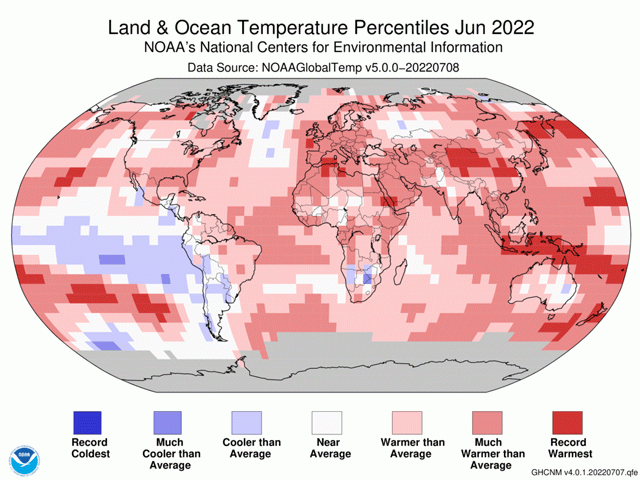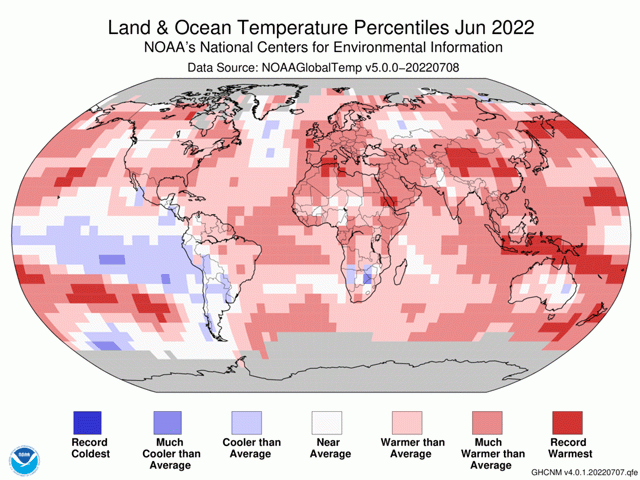Ag Weather Forum
Very Warm Northern Hemisphere in June 2022
June 2022 continued the run of months with temperatures above the 20th century average. NOAA's June climate report notes that June 2022 was the 46th consecutive June and the 450th consecutive month with temperatures at least somewhat above the 20th century average. World average temperatures were 0.87 degrees Celsius or 1.57 degrees Fahrenheit above the 20th century average. This was the sixth-warmest June in the 143-year record.
There was also a new record percentage of the Earth's surface where June temperatures were the highest on record for the month of June. There was record June warmth in parts of China; the northern, western and southeastern Pacific Ocean; small areas of the Middle East; and in northern Africa. In all, 7.68% of the world land and ocean surfaces had record-high June temperatures. That breaks the previous record for June set back in 2010 of 7.37%. Records of this topic began in 1951.
Europe warmth was notable. Some of the highlights for Europe include: Norway had its 10th-warmest June on record. There were 44 weather observation sites in Norway which had their highest June temperatures on record.
Spain had its earliest heat wave on record from June 11-18, tying a record set back in June 1981.
P[L1] D[0x0] M[300x250] OOP[F] ADUNIT[] T[]
France had its third-warmest June since national records began in 1900. Only Junes of 2003 and 2017 were warmer.
Switzerland had a monthly temperature that was almost FIVE degrees Fahrenheit above the 1991-2020 average and was the second-warmest June since recordkeeping started in 1864 -- second only to June 2003.
Austria had a national temperature that was FOUR degrees above the 1991-2020 average, the fourth warmest on record dating back to 1766.
In the Western Hemisphere, June temperatures in North America were the seventh warmest on record. South America had a June temperature that was above average but was the coldest June since 2016.
U.S. conditions in June featured above-normal temperatures and quite a large percentage of the lower 48 states with below-normal precipitation. The average contiguous U.S. temperature during June was 60.7 degrees F, 2.2 degrees F above the 20th century average, ranking 15th warmest in the 128-year period of record. And farther north, Sitka, Alaska, had its warmest June on record while Anchorage and Kodiak were second warmest. Also, for the first time on record, Anchorage reported daily high temperatures of at least 60 degrees F every day during June.
U.S. June precipitation was below average. The June precipitation total for the contiguous U.S. was 2.33 inches, 0.60 inch below average, tying with 1930 for 12th driest in the historical record. A dominant ridge of high pressure across the central and eastern U.S. resulted in below-average precipitation totals for the month. North Carolina ranked second driest on record for June and Nebraska seventh driest. Regions with above average precipitation were mainly in the Northwest and in the Southwest. In the Northwest, several atmospheric river events led to occurrences of heavy rain. The Southwest was the beneficiary of an earlier monsoon season relative to the long-term average.
The warmer and drier trend during June over much of the central and eastern U.S. has set the stage for much concern and attention to summer crops going into various stages of new-crop formation, starting with corn tasseling and silking along with soybeans blooming and pod setting. Rainfall timing and coverage, and any relaxation of temperatures, will be key for crops to come close to their potential yield thresholds.
Bryce Anderson can be reached at bryce.anderson@dtn.com
Follow him on Twitter @BAndersonDTN
(c) Copyright 2022 DTN, LLC. All rights reserved.





Comments
To comment, please Log In or Join our Community .